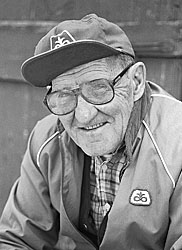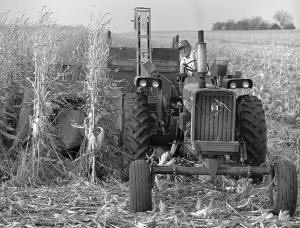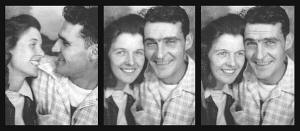|
Obituary
More about Verle and Velma

|
 |
|
1995
|
VERLE DUANE HOWARD
Verle D. Howard – age
85, of Rolfe, passed away Saturday, August 1, 2009 at the Rolfe Care
Center. Verle Duane Howard was born February 22, 1924, at Jolley,
Iowa. He was the son
of Harry and Marian (Patterson) Howard. He attended school in Ware and
Havelock and graduated from Pocahontas High School in 1941. He attended
college in Ames before enlisting in the U.S. Air Force where he served
from 1943 – 1946. He served in North Africa, Egypt and Italy. On May 19,
1947, Verle married Velma Benton at the Rolfe United Methodist Church.
To this union six children were born. Verle worked for Corn Belt Power
in Pocahontas and Humboldt plants and for Voice of America overseas as a
power plant supervisor in the Philippine Islands and Tangier, Morocco.
In 1962, Verle and Velma settled on the farm near Rolfe, retiring in
1994. In 1998, they moved into Rolfe.
Verle was a member of the Shared Ministry of Rolfe where he served on
the church board and the American Legion where he was a past commander.
Survivors include his wife, Velma of Rolfe; daughters, Hope (Brian)
Hutchins of Carson City, NV; Kelly (Dale) Hartman of Britt and Karen
(Carl) Leyba of Thermopolis, WY; 14 grandchildren; six
great-grandchildren; in-laws, Terry Hayes of Aiea, HI; Gail Seeger of
Riverside, IL and Mary Howard of Minneapolis, MN; and many nieces &
nephews.
Verle was preceded in death by his parents; sons, Randy and Monte;
daughter, Joy; twin sister, Doris Hepperle; sister, Genevieve Wilson and
brother, Garth Howard. |
|
MORE ABOUT
VERLE AND VELMA
Verle and Velma were part of
the documentary project
that RHS alumni Web site editor, Helen Gunderson, has been doing since the
early 1990s about the rural neighborhood where she grew up between Rolfe and Pocahontas.
The Howard farm is a mile west of the Deane Gunderson farm.
VERLE AND VELMA'S FARM
(a portion of Helen's book about Verle and Velma, updated in about 2004)
PDF file |
|
|
|
|
|
|
The following are transcripts
and/or MP3 recordings from an oral history interview that Verle and Velma
did with Helen in 1992. A portion of the material includes
comments by their across-the-road neighbors, Marjorie and Paul Harrold,
about Verle and Velma from a separate interview. |
|
|
PONIES
listen
to mp3 audio
length 2:54Velma: When Karen and Kelley
were small, they wanted ponies. Don Shoemaker from Rolfe advertised two
ponies. So we bought the ponies from him. I only remember Buttercup’s name.
Anyway, at that time, we had fences around the buildings, and there was a
wire gate. Those ponies could figure out how to unhook that gate. Every time
the kids tried to pasture them in the area between the house and the barn,
those ponies would work around until they could get out. And away they would
go, back to Don Schoemaker’s place. Then Verle would take the girls in the
car and go to town. They would find the ponies, and the girls would have to
ride the ponies home or they would hang onto the reins and make the ponies
run along behind the car. Verle would just mutter and storm all the way
home. Finally, the kids didn’t ride the ponies anymore, and the ponies were
old. One of Verle’s cousins, Gary, who lived south of Palmer, was here. He
had little girls, and those little girls spent the whole afternoon riding
the ponies. So Verle gave him the ponies, and he took the ponies home. Gary
kept the ponies until they died of old age. He, too, cussed Buttercup
because she was always the one that managed to get out.
Verle: We even had a milk cow.
Velma: We had a milk cow for almost three years. It
was Randy’s chore to milk the cow. And then Randy went to Washington, D.C. —
he won an REC trip in his junior year of high school — and Verle had to do
the milking. The old cow kicked him out of the barn, and she was shipped to
the locker and butchered after that.
|
|
|
CHICKENS
listen
to mp3 audio
length 3:20 |
|
|
SHELLING CORN
listen to
mp3 audio
length 2:18 |
|
|
THRESHING OATS
listen to mp3 audio
length 2:08Helen: What do you
remember about threshing along this road? Verle: When
we moved here in 1940, they still ran threshing machines, and everyone who
had grain furnished a man either to haul grain or to haul bundles. The
Grants owned the threshing machine at first. Then my folks bought a
threshing machine when Grants decided to quit, and we threshed for several
years. That was when you really had the neighborhood working together. The
women always served great big meals — wherever you were, they had to feed
the crew. The crews had six or eight bundle racks, which meant six or eight
men hauling bundles and pitching them into the threshing machine and maybe
one or two spike pitchers in the field that helped the fellas load their
bundles. Then, of course, they had the grain haulers that hauled the grain
from the threshing machine to the farms and elevated it into the cribs. In
some cases, they might even scoop some into a bin for the farmers, but it
entailed a lot of work. You cut the grain in bundles, shocked it, let it dry
out — or cure — and then you threshed it. When the threshing was all done,
the crew always had a great big picnic. That was “settling up day.” You
always paid the owner of the rig for the threshing. I think they got about a
penny and a half or two cents a bushel for threshing it. |
|
|

Verle with his 706 Farmall and mounted
mounted cornpicker harvests corn in 1992,
his last year of farming before retiring.
Click on image for larger view. |
|
|
|
LIVING SIMPLY Helen: My understanding from what
you have told me is that Verle’s parents owned a farm in Calhoun County but
lost it in about 1930. Then they rented near Ware about the time he started
school. After that, they rented near Havelock, and then moved to a place
southeast of Poky before buying this farm in 1940, the year before he
graduated from high school in Poky in 1941. I’m wondering, Velma, did your
folks lose their farm, too?
Velma: My parents didn’t “lose” a farm. They sold.
They had bought my mother’s family farm in Missouri, and they were just
making ends meet and couldn’t keep the payments up, so they sold the farm.
Dad was a hired man for one year, and then he managed to rent a farm down by
Lanesboro. From there, they went to Jefferson and rented for several years
before they bought the farm at Curlew. They always had to struggle to make
ends meet, or at least that’s the way I remember it.
Helen: When you graduated from high school, Verle,
did you ever think you would end up back on this farm?
Verle: Yeah, I had a slight idea that I would, and
more so than ever after I traveled around the world for a few years.
Helen: Why is that?
Verle: For one thing, you are your own boss, pretty
much. You make your life what it is, and that’s the way it is on the farm.
You have nobody breathing down your neck. (chuckle) If you do, you can tell
them to go chase whatever they want to, and it doesn’t make any difference
to you. It doesn’t hurt your business a damn bit.
Helen: How much are farmers really their own boss
when you consider all the government policies and other things that seem to
go against farming?
Verle: Well, at least you still have choices. You
don’t have to enroll in the programs. You’re still more your own boss than
punching a time clock where they have to meet production schedules.
Actually, you make what life is on the farm for yourselves. I can see where
it would get pretty tough on the farmer if you didn’t want to do anything.
(chuckle)
Helen: How would you describe the lifestyle that you
have cut out for yourself here?
Verle: I wouldn’t want to change it.
Velma: Our operation is small by normal standards.
And if we had a family, there is no way we could operate the way we do. We
would have to have more land or another job. But when you are two old people
with rocking chair money, you don’t need to farm a lot of land — just enough
to keep you active.
Helen: You two have often said that you are holding
things together with baling wire. Could you explain what that phrase means?
Verle: When your machinery starts giving you little
problems when you’re in the field, a piece of wire will tie it together
until you get done — that’s what we call, “We’re running on baling wire.”
Velma: When I was growing up, we used that term. When
machinery wore out in those days, they couldn’t afford to trade it in — and
we can’t now on our 160 acres. So we hold the equipment together with baling
wire for one more year. You repair it rather than trading it in on new; we
repair it.
Verle: And then you say, “We baling wired it together
for another year.”
Velma: If the baling wire holds out, we’ll be OK.
Verle: I have the required equipment to farm. When I
quit farming a half section, I never sold any machinery.
Velma: You have bought a different picker.
Verle: But fundamentally, I still have the equipment
I had when I was farming a half section. I do all my own maintenance on it,
and it hasn’t really cost me anything. |
|
|

Verle and Velma
click on photo for larger view |
|
|
|
MEN, WOMEN, AND COUPLES Velma: Verle teases me
all the time about having “his dog house.” When we got the new recliner,
rather than burn the old one, he put it down in the chicken house so he
could have his “dog house.”
Verle: Well, I do a lot of work down there in the
wintertime. I build toy chests and ...
Velma: And then, our daughter, Hope, and her husband got a new TV,
and again, rather than throw it away, they brought it to the farm for the
chicken house, but it never got to the chicken house. It got put in the
playhouse. That’s why he has two places to go — he has the playhouse and the
chicken house.
Helen: So, are you in charge of the house?
Velma and Verle: (chuckle)
Velma: I guess so.
Verle: You better believe she is.
Velma: I don’t spend any more time in his chicken
house than I have to.
Verle: I clean my shoes and take my boots off at the
door of the house.
Velma: Well, doesn’t everyone?
Verle: I can’t even sneak in the door and cross the
kitchen and get a cup of coffee with my dirty shoes on.
Helen: How was it that you started wearing
suspenders?
Verle: Well, every time I got off the tractor or got
on the tractor, I had to pull my britches up. I got so sick and tired of it
that I said I was going to get some suspenders. And I was in the Farm and
Home Store one day, and I saw these suspenders. I put them on and haven’t
taken them off.
Helen: Do you call this farm your homeplace?
Velma: This is the homeplace to the kids because
Grandpa and Grandma Howard lived here, and now we’re here. And when we talk
family reunions, which we have been trying to have every other year at
least, they always think it should be at the farm.
Helen: What’s that like?
Velma: Sheer bedlam. (chuckles) I’m not exaggerating
one bit. We rented campers about four years ago, and the kids were all here.
We set up a tent, too.
Helen: What do the grandkids like to do?
Velma: The adults sit around and eat and visit and
tease and generally enjoy themselves. And we play games with the kids. The
grandkids like to dig out all the old games that their parents had when they
were that age, and they make forts in the bales of straw in the haymow. They
like to play badminton, horseshoes, basketball, volleyball, and whatever
strikes their fancy. The grownups, usually the men go golfing, and the women
sit around and swear because the men don’t come home. (chuckle) You know,
like most families. |
|
|
|
NEIGHBORING Helen: What can you tell me about
neighboring, especially since you live just across the road from Velma and
Verle?
Marjorie Harrold: Verle’s folks moved there the year
before my folks moved here. There weren’t any better neighbors. Of course,
that was back when farmers worked together with haying, and they were
threshing yet, too. My dad and Verle’s dad did all kinds of things together.
That was the war years, too, and we didn’t have any help, so we had to
depend on our neighbors.
Verle: We get along, I would say, ideally. Paul never
bothers me. I never bother him, but if I need another hand, I just hold my
hand up, and he’ll be here. And it works both ways. For instance, if he is
out sorting hogs, and I go out of the house in the morning, it’s nothing for
me to go over and help him sort a load of hogs. By the same token, if I need
something, he would drop everything and come over. There are a lot of jobs
that I can’t do alone; I have to have two more hands. All I have to do is
let him know what I’m going to do, and he’s here. And you don’t even have to
let him know. He’ll come over and tell me.
This spring, I had some wet plowing that I had plowed, and
it was flabby. He came over and said, “Verle, why don’t you come over and
get my big disk and that big engine of mine and disk that spring plowing
again.” So he didn’t wait for me to go over and get his outfit. He brought
it up in the field and came in the house and said, “Well, Verle, come on
out, and I’ll show you the main points of this engine and how to operate it
and where to run the RPM.” So I disked 70 acres, and Paul came back over
again and said, “Verle, if I were you, I would hit that again, and then I
would hit it with your own little disk.” It gives you an idea of what kind
of neighbors you’ve got. I disked the whole field twice, filled the tractor
full of fuel, took it back over, and put it in his yard.
Velma: In the wintertime, Marjorie and Norine and I
get together, usually three times during the winter. We each take a turn
hosting and having coffee. If Marjorie stops over, it’s not an invited
thing. We drink coffee together when we happen to stop by each other’s
homes. We talk on the phone, maybe once or twice a week. We wave to each
other when we go to our mailboxes or when we are mowing the lawns. We
exchange recipes over the telephone. If she has some extra garden stuff that
she knows we don’t have, she brings us a sack, and if I have something, I
take her a sack. We don’t make a point of entertaining each other — we’re
just here. We each know that the other is there.
Verle: As a rule, we each know when the other is
gone.
Velma: We make a point of telling each other if we
are going to be gone, so we can watch their place and they watch ours.
Paul Harrold: When we want to go somewhere, we just
tell the Howards if we are going to be gone for a while.
Marjorie Harrold: We kind of watch. If anything looks
strange, we’ll see what’s happening.
Paul: It’s pretty hard not to look across the road
during the day when we are just an eighth of a mile apart.
Marjorie: We know what each other is doing.
Helen: It’s nice that you have similar standards in
terms of keeping your farms clean. Because you are so close, it would be
horrible to look over at someone else’s eyesore.
Paul: Well, I don’t imagine they like the pigpens
being across from their front yard.
Helen: I think the setup is nice because Velma and
Verle can feel like there are animals around but not have to have their own.
Marjorie: They can look over and see ours. (chuckle)
But sometimes on Sunday when the wind comes out of the north, it’s not so
good.
Paul: And I am sure in the summertime, considering
they don’t have their own livestock, they probably would just as soon not
have their neighbors’ flies, either. |
|
|
NEIGHBORLY HELP
listen to mp3
audio
length 1:11 |
|
|
|
|
PDF file of currently
available transcriptions |
|
|
|
Note: this page was hurriedly
assembled on August 3, 2009, from materials close at hand but not already formatted for
this Web site. Eventually, we will update the page and perhaps reformat it
to make it more user-friendly. |
|
|
|


